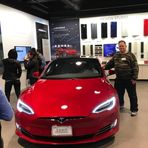The Unlikely Alliance: Trump and Musk's Digital Reunion
August 14, 2024, 10:02 am

Location: United States, Texas, Austin
Employees: 10001+
Founded date: 2003
Total raised: $3.86B

Location: United States, California, San Francisco
Employees: 1001-5000
Founded date: 2011
In the ever-shifting landscape of American politics, few partnerships raise eyebrows like that of Donald Trump and Elon Musk. Once rivals, they now stand as allies, navigating the turbulent waters of the 2024 election cycle. Their recent online chat on X, formerly known as Twitter, was a spectacle that highlighted their evolving relationship and the challenges of modern political communication.
The meeting was meant to be a grand affair. Trump, seeking to connect directly with millions of voters, turned to Musk, the tech titan with a vast digital reach. However, the event was marred by technical glitches. Attendees waited over 40 minutes before the conversation began, greeted by messages of “Details not available.” Frustration bubbled over among supporters, echoing the chaos of a poorly organized rally. Musk attributed the delay to a “massive attack” on the platform, reminiscent of the earlier debacle when Florida Governor Ron DeSantis launched his presidential bid on the same platform.
This digital misfire was more than just a technical hiccup; it was a metaphor for the current state of political discourse. In an age where information flows at lightning speed, the ability to communicate effectively is paramount. Yet, here were two of the most influential figures in the world, struggling to connect with their audience. The irony was palpable.
As the conversation finally commenced, Trump wasted no time. He recounted a recent assassination attempt, framing it as a testament to his resilience. Musk, in turn, offered his support, suggesting a government commission to ensure taxpayer money is spent wisely. He pitched himself for a role in this effort, a move that underscores his ambition to influence policy directly. Trump welcomed the idea, calling Musk “the greatest cutter,” a nod to his desire to streamline government operations.
This moment marked a significant shift in their relationship. Musk, once a critic of Trump, has embraced right-leaning causes and candidates. His endorsement of Trump came just days after the assassination attempt, signaling a newfound alignment. The tech mogul has even created a super PAC to support Trump’s reelection efforts, blurring the lines between business and politics.
Their conversation also touched on immigration, a hot-button issue in the current political climate. Both men criticized illegal immigration, echoing a narrative that resonates with their base. Musk, a legal immigrant himself, emphasized the need for thorough vetting of newcomers. Trump echoed this sentiment, reinforcing their shared stance on border security. This alignment on immigration policy showcases how both figures are willing to adapt their rhetoric to appeal to their supporters.
However, the chat was not without its critics. Vice President Kamala Harris’s campaign quickly seized on the event, framing it as a spectacle for “self-obsessed rich guys.” This criticism highlights the growing divide in American politics, where the wealthy elite are often viewed with suspicion. The notion that two billionaires are shaping the political landscape raises questions about representation and accountability.
Musk’s growing influence in politics is particularly noteworthy. With a net worth exceeding $227 billion, he wields significant power. His past involvement in advisory councils during Trump’s presidency was controversial, and his return to the political arena signals a desire to play a more active role. If Trump were to regain the presidency, Musk’s position could become even more prominent, potentially reshaping policies on electric vehicles and technology.
The technical difficulties during the chat serve as a reminder of the challenges facing both men. Musk’s leadership of X has been scrutinized since he acquired the platform, with critics pointing to issues of disinformation and censorship. The European Union has already warned Musk about the potential amplification of harmful content, highlighting the global implications of their digital dialogue.
As the 2024 election approaches, the stakes are high. Trump’s campaign strategy appears to be focused on provoking his opponents into unscripted media appearances, a tactic designed to showcase his dominance. Meanwhile, Musk’s growing alignment with Trump could have significant implications for the future of technology and policy in America.
In the end, the chat between Trump and Musk was more than just a conversation; it was a reflection of the current political climate. Their alliance, forged in the fires of controversy and ambition, underscores the complexities of modern governance. As they navigate the digital landscape together, the world watches closely. Will this partnership reshape the political landscape, or will it fizzle out like a poorly executed livestream? Only time will tell.
In a world where every tweet can spark a wildfire, the implications of their alliance extend far beyond the screen. The intersection of technology and politics is a battleground, and Trump and Musk are at the forefront, wielding their influence like a double-edged sword. As they continue to chart their course, the question remains: who will ultimately benefit from this unlikely partnership? The answer may lie in the hands of the voters, who hold the power to shape the future.
The meeting was meant to be a grand affair. Trump, seeking to connect directly with millions of voters, turned to Musk, the tech titan with a vast digital reach. However, the event was marred by technical glitches. Attendees waited over 40 minutes before the conversation began, greeted by messages of “Details not available.” Frustration bubbled over among supporters, echoing the chaos of a poorly organized rally. Musk attributed the delay to a “massive attack” on the platform, reminiscent of the earlier debacle when Florida Governor Ron DeSantis launched his presidential bid on the same platform.
This digital misfire was more than just a technical hiccup; it was a metaphor for the current state of political discourse. In an age where information flows at lightning speed, the ability to communicate effectively is paramount. Yet, here were two of the most influential figures in the world, struggling to connect with their audience. The irony was palpable.
As the conversation finally commenced, Trump wasted no time. He recounted a recent assassination attempt, framing it as a testament to his resilience. Musk, in turn, offered his support, suggesting a government commission to ensure taxpayer money is spent wisely. He pitched himself for a role in this effort, a move that underscores his ambition to influence policy directly. Trump welcomed the idea, calling Musk “the greatest cutter,” a nod to his desire to streamline government operations.
This moment marked a significant shift in their relationship. Musk, once a critic of Trump, has embraced right-leaning causes and candidates. His endorsement of Trump came just days after the assassination attempt, signaling a newfound alignment. The tech mogul has even created a super PAC to support Trump’s reelection efforts, blurring the lines between business and politics.
Their conversation also touched on immigration, a hot-button issue in the current political climate. Both men criticized illegal immigration, echoing a narrative that resonates with their base. Musk, a legal immigrant himself, emphasized the need for thorough vetting of newcomers. Trump echoed this sentiment, reinforcing their shared stance on border security. This alignment on immigration policy showcases how both figures are willing to adapt their rhetoric to appeal to their supporters.
However, the chat was not without its critics. Vice President Kamala Harris’s campaign quickly seized on the event, framing it as a spectacle for “self-obsessed rich guys.” This criticism highlights the growing divide in American politics, where the wealthy elite are often viewed with suspicion. The notion that two billionaires are shaping the political landscape raises questions about representation and accountability.
Musk’s growing influence in politics is particularly noteworthy. With a net worth exceeding $227 billion, he wields significant power. His past involvement in advisory councils during Trump’s presidency was controversial, and his return to the political arena signals a desire to play a more active role. If Trump were to regain the presidency, Musk’s position could become even more prominent, potentially reshaping policies on electric vehicles and technology.
The technical difficulties during the chat serve as a reminder of the challenges facing both men. Musk’s leadership of X has been scrutinized since he acquired the platform, with critics pointing to issues of disinformation and censorship. The European Union has already warned Musk about the potential amplification of harmful content, highlighting the global implications of their digital dialogue.
As the 2024 election approaches, the stakes are high. Trump’s campaign strategy appears to be focused on provoking his opponents into unscripted media appearances, a tactic designed to showcase his dominance. Meanwhile, Musk’s growing alignment with Trump could have significant implications for the future of technology and policy in America.
In the end, the chat between Trump and Musk was more than just a conversation; it was a reflection of the current political climate. Their alliance, forged in the fires of controversy and ambition, underscores the complexities of modern governance. As they navigate the digital landscape together, the world watches closely. Will this partnership reshape the political landscape, or will it fizzle out like a poorly executed livestream? Only time will tell.
In a world where every tweet can spark a wildfire, the implications of their alliance extend far beyond the screen. The intersection of technology and politics is a battleground, and Trump and Musk are at the forefront, wielding their influence like a double-edged sword. As they continue to chart their course, the question remains: who will ultimately benefit from this unlikely partnership? The answer may lie in the hands of the voters, who hold the power to shape the future.
